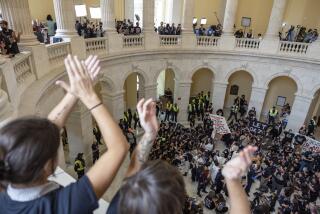Democrats scrap plans to vote this week on historic rule change to allow remote voting
- Share via
WASHINGTON — Amid deep opposition from Republicans, House Democratic leaders on Wednesday scrapped plans to vote this week on a historic change to congressional rules that would have allowed lawmakers to vote remotely during the coronavirus pandemic.
Democrats had hoped to set up a system of proxy voting by which lawmakers could direct another member to cast a vote on his or her behalf, allowing Congress to function without requiring all 435 House members to travel to Washington.
The concern is particularly acute for lawmakers from the West Coast, who face the longest flights to Washington, as airlines reduce operations.
Instead, House Speaker Nancy Pelosi (D-San Francisco) said Wednesday she would set up a bipartisan group of lawmakers to review the issue of remote voting by proxy and reopening the House, according to a Democratic leadership aide.
Republicans almost universally panned the idea, and the aide said Pelosi wanted a bipartisan resolution.
GOP lawmakers argued that allowing members to vote without being in Washington would undermine the American system of representative government and marked a change in precedent that they might never be able to undo. If lawmakers were able to make it to Washington to vote during the Civil War or the 1918 flu pandemic, lawmakers can travel on nearly empty planes to cast their votes today, they said.
“We‘ve operated for 200-plus years without having proxy voting on the floor of the House,” said Rep. Tom Cole (R-Okla.), the top Republican on the House Rules Committee, noting that other parts of the federal government were still functioning.
“It’s not as if the president and vice president are holed up in Cheyenne Mountain or something,” he said in an interview before the vote was canceled, referring to the defense bunker built during the Cold War to ensure the federal government could continue operations if an attack took place in Washington.
House rules have always required members to vote in person in the House chamber. Lawmakers slip an ID card into electronic machines scattered around the cavernous chamber and push a button to record their position on a bill or amendment.
Under the Democratic proposal, which would have been temporary, members would have been allowed to give another member of Congress their proxy to vote on their behalf and in accordance with their instructions. The proxy would have to be arranged ahead of time in writing — likely via email — and the member not in Washington would have to spell out his or her position in advance.
Ensuring that lawmakers can continue their work during the pandemic is vital. Congress has already approved trillions of dollars in spending related to the economic fallout of the coronavirus, and lawmakers are preparing to open federal coffers again with additional legislation.
The Democratic plan also would have allowed the remote meeting of congressional committees, many of which are led by members eager to conduct oversight of the coronavirus relief bills already approved by Congress.
Lawmakers have grappled before with how to function during an emergency or disaster. After the terrorist attacks of Sept. 11, 2001, the House put a rule in place that aimed to ensure Congress could vote even if dozens or even hundreds of lawmakers were incapacitated. But Rep. Zoe Lofgren (D-San Jose), the chair of the House Administration Committee responsible for the operations of Congress, says those plans are not enough to address the current crisis.
“Now we have a situation where everyone is told to shelter in place and not to be with 10 other people at a time,” she said. How can American voters be told one thing “and we’re not going to do the same thing. That’s not setting a very good example.”
Lofgren and Cole will participate in Pelosi’s group to examine the issue, alongside Rep. Rodney Davis (R-Ill.), the top Republican on the House Administration Committee; Rep. Jim McGovern (D-Mass.), chairman of the House Rules Committee; House Minority Leader Kevin McCarthy (R-Bakersfield); and House Majority Leader Steny H. Hoyer (D-Md.).
McCarthy insisted Wednesday that any change in the House’s long voting history needs to be bipartisan — a point he made to Pelosi in a conversation between the two leaders Wednesday morning.
“I made a commitment to her that we would be able to look at that and get to that point,” he said of bipartisanship. He insisted that the group address not only remote voting, but also “reopening” Congress.
McCarthy suggested that reopening Congress may involve calling back only the lawmakers who serve on certain committees until a major vote is planned that would require all members.
Republicans are worried that the Democrats’ plan could open the door to allowing proxy or remote voting more often. Lofgren said in an interview before the vote was scrapped that if the process worked well now, committee hearings could be conducted remotely more often.
Before the pandemic, there was a lot of cost and air pollution associated with flying members of Congress and witnesses all over the country, she said. As long as the hearing is publicly accessible and lawmakers are accountable, “that may be something we might want to think about doing more often.”
Another chief concern has been cybersecurity vulnerabilities. But Democrats said the public nature of the vote should ensure that members would know if his or her vote was changed.
Republicans said the process would further consolidate power in congressional leadership. For years, members of both parties have grown frustrated with bills that are written by congressional leaders and only shown to rank-and-file members shortly before the vote is called.
Democrats were trying to “take advantage of this crisis and really take the voice of members and people who elect them out of service by authorizing a proxy process that can give leadership more power,” Davis said in an interview before the vote on the rule change was canceled.
“We are elected to represent a district in this democratic republic. We’re supposed to be the voice of our district. We’re not supposed to give that voice to somebody else,” Davis said.
Proxies could also become a partisan tool, he said. While the Democratic plan would require those receiving a proxy to vote as the absent lawmaker instructed, giving a proxy to prominent lawmakers could carry symbolic significance, he said. He gave an example, citing MSNBC host Rachel Maddow and Rep. Alexandria Ocasio-Cortez (D-N.Y.).
If Maddow “said you ought to give AOC your proxy vote, some people here would say, ‘OK, I’ll give AOC my proxy vote. Cause that’s going to get me more social media hits and likes and retweets,’” Davis said. “Conversely, if [Fox host] Sean Hannity said … go give [Rep.] Jim Jordan your proxy vote, you’ll be cheered for it by our crowd.”
More to Read
Sign up for Essential California
The most important California stories and recommendations in your inbox every morning.
You may occasionally receive promotional content from the Los Angeles Times.











